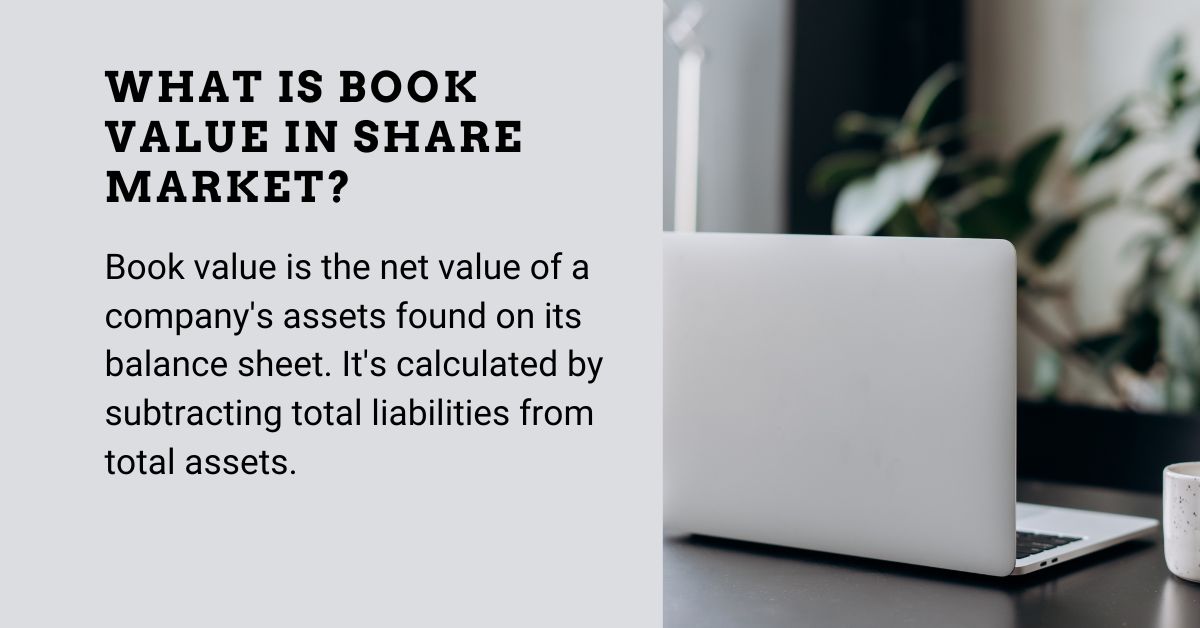There are many methods to determine the value of shares. Investors are prepared to pay the market value to buy a share.
You can think of book value as the net asset value of a stock. Many well-known investors use book value to determine the fair price of a stock, which ultimately helps them in their investment decisions.
What is Book Value in Share Market?

In the share market, the book value is the net value of a company’s assets after taking into account its liabilities. It is calculated by subtracting a company’s total liabilities from its total assets. This value represents the theoretical amount that would be paid out to shareholders if the company were liquidated and all liabilities were repaid.
Book value is often used by investors to determine whether a share is undervalued or overvalued, as it provides a basis for comparison with the share’s current market price.
Formula of Book Value
Book Value per Share = Shareholders’ Equity / Number of Outstanding Shares
For Example:
Imagine Company ABC has the following simplified balance sheet:
Assets:
- Cash: ₹10,000,000
- Inventory: ₹20,000,000
- Property and Equipment: ₹50,000,000
Total Assets: ₹80,000,000
Liabilities:
- Accounts Payable: ₹15,000,000
- Long-term Debt: ₹25,000,000
Total Liabilities: ₹40,000,000
Shareholders’ Equity
- Total Assets – Total Liabilities = Shareholders’ Equity
- ₹80,000,000 – ₹40,000,000 = ₹40,000,000
Outstanding Shares:
- Let’s say Company ABC has 2,000,000 shares of common stock outstanding.
Calculating Book Value per Share:
- Book Value per Share = Shareholders’ Equity / Number of Outstanding Shares
- ₹40,000,000 / 2,000,000 shares = ₹20 per share
Why Does Book Value Matter?
One of the main advantages of using book value to estimate the value of a share is that it removes the judgement. We get the actual value of the company’s liabilities and assets, not an imaginary market value.
Depending on certain factors, the market value of a company may be either overvalued or undervalued. However, the book value of a company provides a better picture by adding the actual value of the assets after losses and the total remaining liabilities of the company.
Value investors often use book value to find stocks that are trading at a discount. If a stock is trading below its book value, they see it as a fantastic investment opportunity. However, one problem could be the potential artificial inflation of asset valuations. We should investigate this potential when calculating the book value of a company.
What Are the Limitations of Book Value?
The restrictions relating to the book value are listed below:
- It considers only tangible assets and excludes intangible assets such as patents, trademarks and copyrights.
- The pricing is based on historical costs and does not take current inflation, currency and market fluctuations into account.
- The calculation is based on the company’s monthly or annual balance sheet, which makes a review of the book value superfluous.
Also Read:
- What Is Market Capitalization? How To Calculate Market Cap And Understand Company Value
- What Are Preferred Dividends And How Can They Benefit You?
What is a Good Book Value?
A “good” book value cannot be defined individually, as it depends on a variety of situations. Here you can find out how to determine the book value and which factors you should take into account:
Price-to-book ratio (P/B)
A more effective way to understand book value is to look at the price-to-book ratio (P/B). This ratio compares a company’s market price per share to its book value per share. Here is the full meaning:
- Price-to-book ratio < 1: The company’s market value is less than its book value. This could indicate an undervalued stock, possibly meaning that the market doesn’t recognise the full value of the company’s assets.
- P/B ratio > 1: The market value is higher than the book value. This usually indicates that investors are willing to pay a premium because they believe in the company’s future growth and intangible assets (which aren’t included in the book value).
It seems that there is no universal definition of a “good” book value. Consider it as a single component when valuing companies, always taking into account the industry context and other economic factors.

